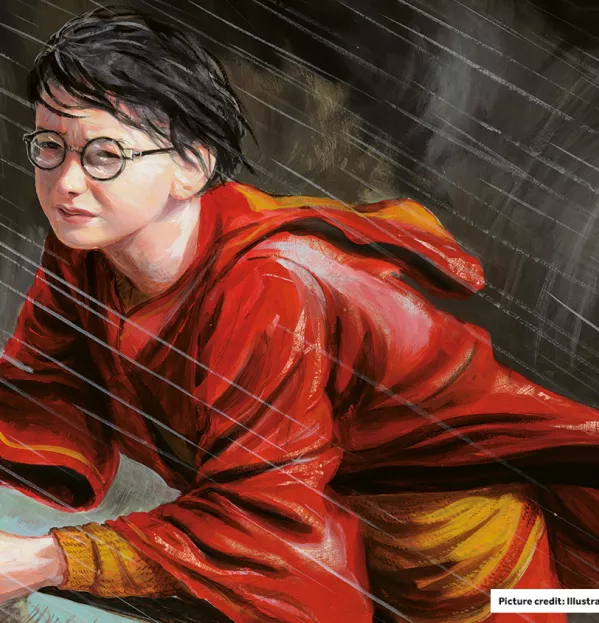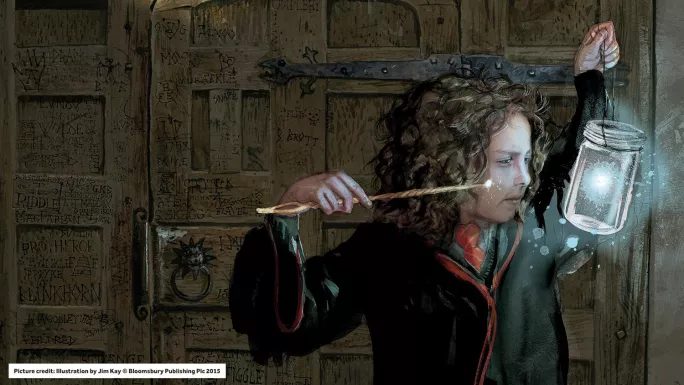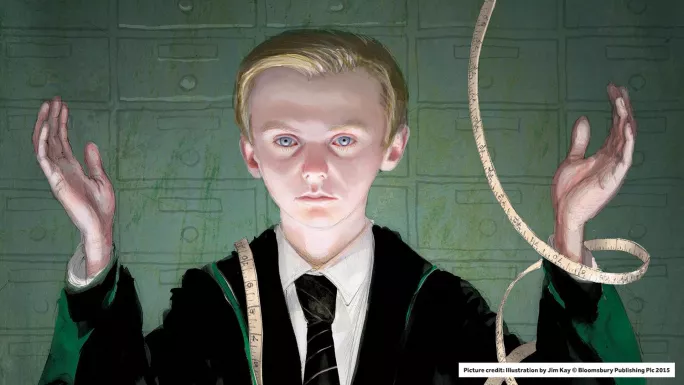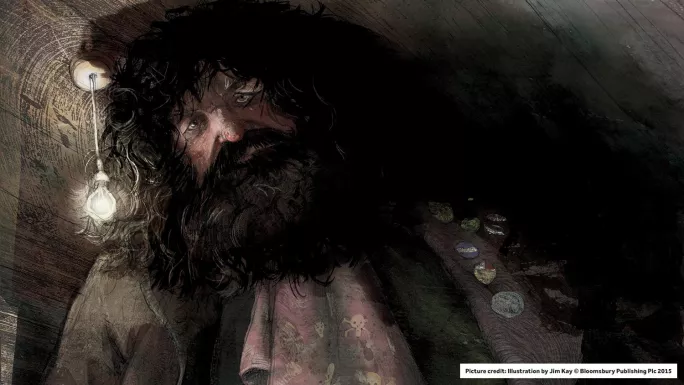#ToYouFromTes: Harry Potter and the half-baked theories

It was on a coach journey to Boulogne in 1997 that I first got to go to Hogwarts. I was 10 years old and bored, so my friend Madeleine lent me a book that she hadn’t stopped raving about. From the first page, I was hooked. It wasn’t the medieval walls and towers of a northern French city that I spent the next few hours exploring but the wonderful world inhabited by a boy wizard called Harry Potter.
Six more books and an estimated 450 million worldwide sales later, we have arrived at the 20th anniversary of when JK Rowling’s Harry Potter and the Philosopher’s Stone was first published. Little did any of us know back in June 1997 that the boy with a lightning-shaped scar on his forehead - and the writer who dreamed him up - would become part of our national culture.
How significant a part, you ask? I may have been one of the first children devastated not to receive an owl on my 11th birthday but I certainly wasn’t the last. And though, as a semi-seasoned journalist, I know that the plural of anecdote is not data, I am convinced that every teacher thinks as I do about the Harry Potter books: they are clearly brilliant, everyone loves them and, because of them, the literacy levels of the country must have soared like a feather that’s been Wingardium Leviosa-ed.
Unfortunately, my belief is not enough to persuade the editors of Tes to let me honour the Potter-versary by writing 2,000 words dissecting the subtle nuances of Severus Snape’s changing allegiances through the years. (If you wish to read such a piece, my contact details are easily findable and the piece is all but written.) Instead, they asked how sure I was about my belief that teachers unanimously love the series and about it being responsible for improving the literacy of millions. “Very sure,” said I. “OK,” they said. “Prove it.”
Well, I am pleased to report that, at first glance, the numbers appear to reinforce my theory. A poll taken in 2005 - the height of “Pottermania” - by the Federation of Children’s Book Groups found that 59 per cent of children felt the books had helped them to improve their reading skills. Almost half said the series had encouraged them to read other books. And more than eight in 10 teachers believed that Potter had had a positive impact on children’s literacy.
Fast-forward 12 years (no Time-Turner required), and many teachers are now even using the books in the classroom for English lessons.
One such teacher is James Tickle: Harry Potter enthusiast, muggle and second in department (key stage 3 coordinator) for English at St Edmund Arrowsmith Catholic High School, in Ashton-in-Makerfield.
Tickle has been using Harry Potter and the Philosopher’s Stone to teach a scheme of work in Year 7 for the past four years or so (if that sounds interesting, and shouting “Accio scheme of work” doesn’t produce results, you can find it at bit.ly/HPlessons). He says that it is “a genuine pleasure” to explore the text with pupils.
“It is complex enough that you can do so much with it. There’s so many different directions you can go. You can get really creative,” he says.

It helps that Tickle (chosen Hogwarts house: Ravenclaw) enjoyed the Potter books as a teenager. He credits the series for keeping up a love of reading that was in danger of falling away.
“Boys tend to drop off reading in the teenage years and then pick it up again a few years later,” he explains. “It did encourage me to go out and find other books, so I didn’t have that break in reading. It helped me longer-term.”
It may seem strange that a book can entice a child of 10 into reading and their 20-year-old self would still be interested in keeping up with the series, but the Harry Potter novels were never, as such, “children’s books”. In last year’s Scholastic Reading Report, Harry Potter was one of only two series of books (along with Diary of a Wimpy Kid) to feature in children’s top reading choices from the age of 6 right through to 17. And so many adults read Potter that the publisher released adult editions, with more mature cover artwork, so as to reduce potential embarrassment on their commute to work.
If you don’t believe that sensible and intelligent adults read the books, too, then let me introduce you to Harry Potter fan Daniel Willingham, who just so happens to also be one of the world’s leading cognitive scientists, an expert in reading and a professor of psychology at the University of Virginia (a no-maj college of renown).
“It’s wonderful writing and a wonderful narrative,” he says.
Confident that - Alohomora! - I have unlocked the key to my point that this is a book for all ages and universally liked, I ask Willingham whether it has that magic formula all great cross-over books must have to be successful. His reply isn’t exactly as I expected.
“There isn’t [a formula],” he says, bluntly.
But Willingham (who refuses to align himself to a Hogwarts house, on the basis that “you can’t guess what the Sorting Hat will decide”) found the Potter books readable and enjoyable. In particular, he says, the book captures the experience of growing up and being a teenager. For example, he says, if you look at the fifth book, Harry’s “kind of a pain in the ass”.
“He’s 15 or so and he thinks the world is against him and he’s struggling with it, and I think about my own experience of being 15 years old and I think, yeah, that’s pretty much what I was like,” Willingham laughs. “The whole world is very unfair and, furthermore, no one understands me; my situation is completely unique in the history of the world. Although Harry, I guess, is a little more justified in thinking that’s true.”

Buoyed by such praise, I decide to go for the big question: OK, a formula for literary success does not exist, but can he tell everyone how the books have clearly had a positive impact on the literacy levels of the nation, if not the world?
Unfortunately, he dismisses any notion of Harry Potter having any sort of widespread impact on children’s literacy.
“I think the ‘Harry Potter effect’ was the secret hope of parents and teachers trying to find the perfect book for a child,” he explains. “A lot of eager, enthusiastic adult readers had a book like that: they had a book that they fell in love with that told them reading was worth their time.”
Indeed, Rowling herself has said: “If you don’t like to read, you haven’t found the right book”.
But, Willingham argues, this is a fallacy based on the fact that most teachers were themselves children who enjoyed reading.
“It’s possible that all those people who are enthusiastic adult readers had that magic book, but not all children who have a magic book become eager adult readers.”
To illustrate this point, he uses the example of someone who has never liked broccoli. However, on travelling to a foreign country, they find that it is prepared in a way there that they love. “And then you go back home, and broccoli is the way it always is, and someone says, ‘Why aren’t you eating broccoli now?’ And you say, ‘Because it doesn’t taste like it did when I had it in Cameroon.’”
He also points to Potter as a social phenomenon - a craze, although not one in the mould of fidget spinners or Tamagotchis.
“Some children of that age, where you’re hypersocial, were reading it because you were really a nerd if you didn’t read it. But the craze is only a piece of it. There’s something about fidget spinners and Tamagotchis that feels random. You don’t look at a fidget spinner and say, ‘My God, that’s a damn good thing and I can see why people like it.’ But people have said that, and continue to say that, about Harry Potter.”

Disappointed, I attempt to give myself a boost by talking to Tickle once more. But he says he sees a lot of sense in Willingham’s words. There was “no escaping” the books at the time of publication, he recalls.
As someone who may or may not have queued in costume outside my local Borders at midnight to get their hands on a copy of the fifth book (I definitely did), I admit that the series did get to a point that could be considered more a social phenomenon than a literary one.
So, only 1,500 words into my investigation, am I already at the point where I might have to Avada Kedavra the whole notion of Harry Potter as saviour of children’s literacy?
Before I get overly despondent, I remember Albus Dumbledore’s wise words: “Happiness can be found, even in the darkest of times, if one only remembers to turn on the light.”
And here, with some research that promises to throw Lumos on a rather gloomy outlook, comes Jane Sunderland. An honorary reader in linguistics and English language at Lancaster University, she developed an interest in the effect of the Potter books on literacy after seeing multiple media reports on the phenomenon that contained relatively little evidence.
She, along with her colleagues, interviewed hundreds of primary- and secondary-aged children as part of a qualitative survey in 2012-13 to find out what effect the books had had and what children themselves thought.
The survey results showed that around half of children hadn’t read the books - a statistic that tallies with what Tickle reports of his own pupils’ experiences.
Sunderland (who would prefer to be in Gryffindor) says this is a good hit rate but, obviously, it means that the series isn’t as ubiquitous in children’s reading as perhaps some might think.
The Potter effect
In terms of the books’ impact on literacy, Sunderland says, it’s difficult to make a distinct pronouncement. However, the children were asked if they thought that the series had made a difference to their reading. A majority of them said that Harry Potter had helped them to read more fiction, more books and harder books.
And a look at literacy rates pre- and post-1997, at first glance, could point to Harry Potter as The Boy Who Saved Reading. A study from the University of Leeds (bit.ly/LiteracyTrends) shows that, between 1948 and 1996, literacy rates in the UK changed very little. By contrast, since 1997 - the publication year of the first Potter book - literacy rates have been steadily rising (bit.ly/LiteracyRates).
Alas, using this evidence is as iffy as Professor Trelawney’s prediction hit rate. Surveys where children say they think the books helped them to read more are not proof that they did or, if they did, that Harry Potter was the cause. And 1997 was not just the introduction of the Harry Potter phenomenon, but also of the Labour government’s National Literacy Strategy. So, it could be argued, schools were creating a culture that prioritised and celebrated reading at the perfect time for a book about witches, wizards and growing up to come along and capture a nation’s imagination.
Clearly, however much I’d like it to be true, Harry Potter did not really get the nation’s young people reading - and improving that reading - to the extent that I had hoped. Simple good teaching and a concentration on literacy is probably (probably) more deserving of praise.
Then, as I was finishing up my research for the piece, the Bat-Bogey Hex to my theory began to emerge. I started finding teachers (aka They Who Must Not Be Named) that did not rate the books either. My theory had been that as nearly all teachers would have been confident readers, or at least people who enjoyed reading, then surely they would all be Harry Potter advocates. Not so.
“I do not own a Harry Potter novel,” says Katherine Howard, an English teacher based in Leicestershire, who was more than happy to send me a Howler on the subject. “My reasons for such a bold statement are many, but principally because the words just don’t add up. While friends around me contributed to the swirl of Hazza hysteria following the release of the first book in 1997, I watched on reluctantly and indignantly.
“As a teacher in my ever-so-slightly older years now, my feelings towards Harry Potter have remained unchanged but with different grounding; the literacy of the text is simply not enough. The vocabulary doesn’t stretch as other literary works manage to do so; Harry’s story of success is neither believable or achievable to the average (or less than average) child - if I work hard enough, I cannot and will not excel at either wizardry or Quidditch - and the obstacles encountered by Harry on his journey during the Hotel Hoggles years does not resonate with me as a child nor adult.”
Well, that’s pretty negative but…oh wait, she’s not finished.
“Research carried out by the Federation of Children’s Book Groups [FCBG] when HP was wallowing in its proverbial mud [Harry Potter and the Goblet of Fire was released at the box office the same year] stated that six out of 10 children thought the series helped with their literacy. Colin Harrison, then a professor of literacy studies at the University of Nottingham, stated that, ‘The sheer pervasiveness of JK Rowling’s books means Harry Potter will certainly have impacted on children’s literacy levels’.
“I have a number of issues with this statement. Firstly, children are not the finest evaluators of themselves; self-reflection is not a skill that comes easily to any of us and a statistic that essentially defuncts its own purpose. On a secondary level, popularity does not support progress. By liking something, you do not improve at it, which is essentially the point that this seems to be making.”
Howard, it has to be said, makes a compelling point. As much as I would like Harry Potter to be the force for every child that it was for me, the evidence quite simply doesn’t stack up.
However, like (spoiler alert) Harry after he has been struck with a killing curse by Voldemort, my theory is not dead yet. Far from it, in fact. Let me introduce you not to another expert or to a teacher, but to Kathryn: an eight-year-old who’d happily be in Gryffindor (“because they’re brave”) or Ravenclaw (“because they’re clever”).
“The Harry Potter series is amazing. It is one of the best things I’ve ever read. I like it because it’s about people fighting for what they believe in, and not giving up.”
The effect that Harry Potter has had on the country’s literacy as a whole? That’s data. But the effect the books have had on countless individual young lives, including mine? Well, that’s clearly magic.
Sarah Cunnane is deputy head of content curation at Tes. She tweets @Sarah_Cunnane
You need a Tes subscription to read this article
Subscribe now to read this article and get other subscriber-only content:
- Unlimited access to all Tes magazine content
- Exclusive subscriber-only stories
- Award-winning email newsletters
Already a subscriber? Log in
You need a subscription to read this article
Subscribe now to read this article and get other subscriber-only content, including:
- Unlimited access to all Tes magazine content
- Exclusive subscriber-only stories
- Award-winning email newsletters